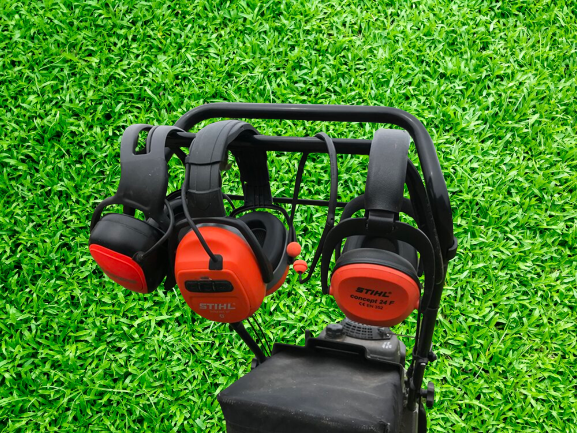Ear protection is essential when engaging in any activity that could cause exposure to loud noises, such as mowing the lawn, gardening, or landscaping. Unfortunately, there are many ear protectors on the market that are not effective or safe for use. In this article, we will provide you with information on the best ear protection for mowing, gardening and landscaping. So that you can make an informed decision about which product to buy. We also recommend taking some safety precautions while using these products to ensure your ears are safe and protected.

Earplugs vs Ear Muffs
Earplugs are a great way to protect your ears while you’re mowing the lawn, gardening, or landscaping. These help block out noise so that you can concentrate on your work. They also come in handy if you’re working with loud machinery or if the environment is particularly loud.
Ear muffs are another good option for ear protection. Ear muffs provide more complete protection than ear plugs, and they’re also easier to use. You simply slip them over your ears and adjust the fit according to your own preferences. Most ear muffs come with built-in microphones that help block out background noise.
How to Choose the Right Ear Protection for Mowing, Gardening & Landscaping?
There are a few things to keep in mind when opting for ear protection while performing these activities. For mowing, the noise level will vary depending on the type of mower and the terrain being cut. However, it is generally recommended that ear protection be worn at all times when using a power lawn mower or an electric hedge trimmer. For gardening, noise levels will depend on the type of tool being used as well as the height of the plants.
Generally speaking, it is recommended to use ear protection when digging, weeding, and transplanting plants. When working with tools that create a lot of dust, like a riding mower or rototiller, it is also important to wear protective eyewear. Lastly, for landscaping work such as trimming bushes and shrubs, it is always recommended to wear hearing protectors along with eye protection.
Noise Levels from Various Tools
Noise levels from various tools can vary greatly. To get an idea of what noise each tool produces, we gathered data from popular, high-end lawnmowers and gardeners’ tools.
Lawn Mower:
The Husqvarna HM 380 offers the quietest operation of any residential lawnmower we tested with an average noise level of 46 dB. It’s not the most powerful or fastest machine on the market, but its reduced noise levels make it a great choice for those looking to keep their neighbors privacy-protected while they mow the lawn.
Garden Tool:
The Genesis3 Garden Hose reel has an average noise level of 55 dB, making it one of the noisiest garden hoses on the market. However, its unique design provides superior water pressure and flow rates compared to other hose reels in its price range. This makes it a great option for watering plants at a distance or for use in wet or difficult terrain.
Types of Ear Protection
There are many different types of ear protection that can be used while mowing, gardening, or landscaping. The type of ear protection that is best for a person depends on their specific activity and the noise level that they are exposed to.
Some of the most common types of ear protection are:
- Earplugs:
Earplugs are the most common type of ear protection for mowing, gardening, and landscaping. They offer good protection from noise and reduce exposure to hazardous noise levels. There are many different types of earplugs, so it is important to find one that is designed specifically for these activities.
- Safety Goggles:
Safety goggles provide good overall eye safety and can help protect against dust, debris, and other objects that may be thrown into the air during gardening or landscaping activities. They should always be worn when working with power tools or other equipment that could generate dust or debris.
- Noise-Cancelling Headphones:
Noise-cancelling headphones block out distracting sounds while you work and can provide excellent overall sound quality. This type of headphone is ideal for people who want to listen to music or audiobooks while they work.
Read More: Ride-On Brush Cutter
Choosing the Right Ear Protection for You
There are many types of ear protection available on the market, and it can be difficult to know which type is best for your specific job.
When mowing:
First, consider how loud the engine of your lawnmower is. If it’s relatively quiet, then a passive ear protector like an E-Series hearing protector may be enough. If the lawnmower is louder, then a more effective option might be a custom-fit earplug like those made by Howard Leight.
When gardening:
Similarly, if you’re using a hand tool like a shovel or hoe, you’ll need to factor in the noise level. Passive earplugs will do the trick if it’s lower-level noise, but if it’s too loud for passive protection then you may need an active device like electronic earmuffs or an enclosed head guard.
When landscaping:
Finally, when landscaping it’s important to keep in mind both wind and rain noise. Many landscapers use either electronic or acoustic lawn mowers that are specifically designed to reduce these noises. Likewise, some landscape contractors will put up temporary sound barriers. While they’re working to help avoid damage from the powerful winds and rains storms can produce.
How to Wear Ear Protection While Mowing, Gardening & Landscaping
There are a variety of ear protection products on the market for those who want to avoid hearing damage while mowing, gardening, or landscaping. Ear plugs can be effective when used in conjunction with other safety precautions, such as wearing a helmet and eye protection. There are also earplugs designed specifically for these activities, such as those marketed toward lawn care.
When using hand-held tools like shovels and hoes. It is important to use proper hearing protection if you want to avoid injuries like cuts to your ears. Many gardeners use “ear defenders” which come in many different styles and sizes. It is important that these devices fit well so that they do not fall off during the Activity. Additionally, it is important to hold the device close to your head so that less sound reaches your ears.
Tips for Keeping Your Ears Safe When Working
If you’re looking for a safe way to protect your ears while working around loud noises, there are a few things to keep in mind.
Make sure you have the appropriate ear protection. This includes ear muffs, ear plugs, or a headset. The type of ear protection you choose will depend on the noise level and your work environment.
Be aware of the safety guidelines for using noise-canceling headphones. Always wear them in a safe way so that they don’t hit your head or interfere with your vision. And never operate heavy equipment while wearing them.
Remember to take breaks every now and then and listen to quiet music or nature sounds to let your ears rest.
